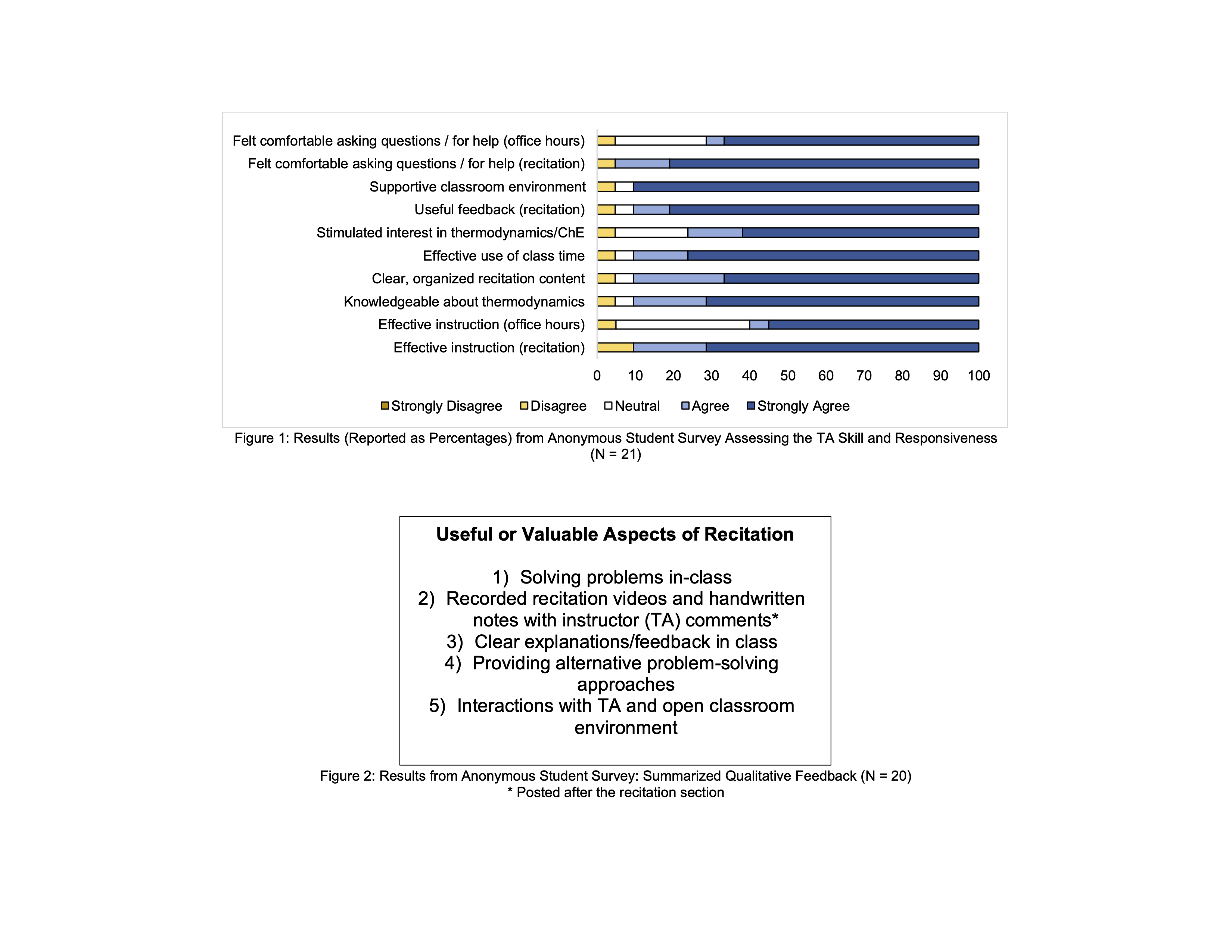2022 Annual Meeting
(2ds) A Chemical Engineer’s Path to Chemical Engineering Education: Supporting Students' Transition into the Chemical Engineering Discipline
My research focuses on engineering education in the chemical engineering context, particularly how to support students during their transition into the chemical engineering discipline. My research interests are motivation, problem-solving, and self-regulation in engineering students.
Current Research and Future Directions:
- The impact of motivation and psychological distress on chemical engineering students in an MEB course during COVID-19
This study examined the relationship between motivation, psychological distress, and studentsâ performance in an online, asynchronous sophomore-level MEB course during the COVID-19 pandemic. We found that studentsâ motivation declined over the term, particularly for autonomy and competence. Also, changes in competence beliefs had an unexpected relationship with final grades, particularly for women. Women with increased competence beliefs over the semester were statistically more likely to perform worse than their peers. These results illustrate how motivation may decline during the semester and indicates the challenges students face in calibrating their perceived abilities with actual performance in an online learning environment. Additionally, psychological distress negatively predicted studentsâ motivation.
- Developing resources and propagating evidence-based teaching practices in the MEB course
We developed educational resources to improve the learning outcomes for students in the introductory MEB course. Many students find this course challenging because of the course content and its reputation as a weed-out course. We will be implementing these resources and best practices for the MEB course in Fall 2022 to understand how these changes impact learning outcomes for students. These results will be insightful in addressing key equity issues within engineering education and help engineering educators understand the conditions under which educational innovations propagate successfully to other settings.
- Mixed method research study on learning strategies in an MEB course
In chemical engineering courses, apart from learning and mastering course content, students also have to develop appropriate learning and study skills. Learning and student engagement do not occur in a vacuum and are influenced by personal and sociocultural factors, including studentsâ motivation/emotions and the learning environment. In this ongoing study, we are using a mixed-method research design to investigate studentsâ learning experiences in the MEB course. We are interested in understanding how students navigate this introductory course and develop the appropriate learning strategies. These results will inform research and practice on what makes students successful in introductory engineering courses. Future work will expand this ongoing project to other institutions and the rest of the chemical engineering curriculum (beyond the MEB course).
Research Publications:
Adaramola, A., Godwin, A., & Boudouris, B. (2022) Student Outcomes Related to Academic Performance, Motivation, and Mental Health in an Online Materials and Energy Balances Course During the COVID-19 Pandemic, Chemical Engineering Education, 56(1), 36 â 46. https://doi.org/10.18260/2-1-370.660-125278%20
Adaramola, A., & Godwin, A. (2022). Contextualized Self-Regulated Learning: Chemical Engineering Studentsâ Learning Experiences in a Materials and Energy Balances Course. ASEE annual conference proceedings. Minneapolis, MN.
Teaching interest:
I view teaching as an opportunity to engage with students and support their interests in chemical engineering. In my experience as a teaching assistant (TA), Iâve interacted with students who need to maintain their scholarship requirements, who want to use their chemical engineering degree to give back to their communities, who need a boost in their confidence and problem-solving skills, and who are learning through difficult circumstances such as the loss of a family member or dealing with COVID. Teaching offers the dual challenge and opportunity to engage with students who have different situations and prior experiences. In addition to the MEB and Thermodynamics courses, I am interested in teaching Engineering Statistics, Chemical Engineering Safety, or Senior Design/Capstone in the future. Iâd like to teach higher-level courses, such as Safety and Design, to assess studentsâ abilities to apply chemical engineering concepts to real-world problems.
Teaching experience:
I was a TA for the MEB course in Fall 2020 and the Undergraduate Thermodynamics course in Spring 2022. In Fall 2020, due to the COVID-19 pandemic, the MEB course was delivered asynchronously (virtually) at my institution. As a TA that semester, my roles included answering questions and guiding studentsâ problem-solving attempts during office hours, developing exam rubrics and grading exams, as well as supporting the teaching faculty. As a TA for the Undergraduate Thermodynamics course, I was also responsible for creating and delivering recitation content for two sections each week (there were approximately 25 students in each section). At the end of the semester, I also created a problem for the final exam to test studentsâ knowledge of fugacity and vapor-liquid mixtures. I contributed to studentsâ success in this course by providing a supportive classroom environment, providing useful feedback, and ensuring that most students felt comfortable asking questions during the recitation sections (Figure 1). I enjoyed my experience teaching thermodynamics, especially engaging students with the content on a deeper level and creating space for active problem-solving during class. This Fall, I will be co-instructing the MEB course in a flipped classroom format. I will be implementing the educational resources we previously developed and other pedagogical practices to make the class more engaging and motivating for students.
